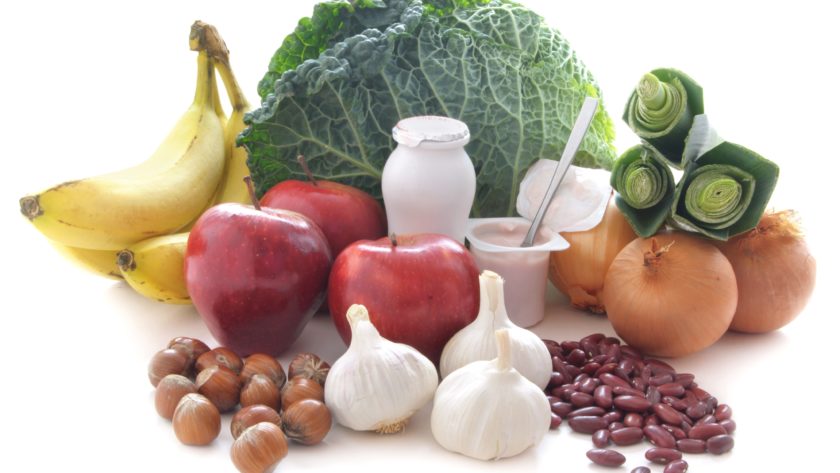In a previous segment on the effects of an unhealthy gut, a ‘malfunctioning gut’ can affect your immune system and overall health, and what you eat influences the state of your gut microbiome. Here are some tips to help guide you through the maze of what to eat for optimal gut health and longevity.
What Should You Feed Your Gut Bacteria?
Nutrition has a strong influence on the diversity and composition of your microbiome, that is, whether it stays healthy or not. Your “gut bugs” love probiotics, prebiotics, and polyphenols. Gut microbiome is home to all the bacteria in your gastrointestinal tract (intestines).
1. PROBIOTICS are good bacteria for your gut and found in food. They can help the good bacteria stay in balance, so they’re not outnumbered by the bad ones, and help strengthen the immune system and improve gut health. Probiotic sources include:
- Foods with live bacterial cultures, i.e., lactobacillus and bifidobacteria (such as yogurt, kefir, and aged cheeses)
- Fermented plant foods, i.e., kimchi, raw sauerkraut, tempeh, miso, kombucha*, “naturally fermented” pickled vegetables (that is, they’re pickled using the natural fermentation process with live organisms NOT vinegar)
* Kombucha, also known as “mushroom tea” or “tea fungus”, is a fermented green or black tea. It’s made by adding a symbiotic culture of bacteria and yeast (SCOBY), commonly called the “mother”, “tea fungus”, or “mushroom”, to the tea, which is then allowed to ferment for a week or more. During this process, the bacteria and yeast clump together and float on the surface of the tea.
NOTE: Not all fermented foods contain active cultures. For example, beer and wine remove the live organisms (i.e., yeasts that allow fermentation). Also, heat inactivates the organisms, so heat-treated fermented foods, like baked bread and canned sauerkraut, do not have probiotic activity.
2. PREBIOTICS help the bacteria grow. Think fiber! High-fiber foods most beneficial to gut microbiome. Prebiotic sources include whole grains, fruits, vegetables, legumes, such as:
- Wheat, oats
- Apples, bananas, berries
- Onions, garlic, leeks
- Asparagus
- Beans, peas, lentils, soybeans
- Roots and tubers, e.g., beets, carrots, Jerusalem artichokes (a.k.a. sunchokes), jicama root, sweet potatoes

Prebiotic Diet and Weight Loss
Studies have shown that a prebiotic diet can improve the body’s gut bacteria profile, which can benefit weight loss and conditions associated with obesity, such as insulin resistance. These changes in the gut microbiome are linked to caloric intake, blood sugar, insulin, satiety hormones, as well as cholesterol and triglyceride accumulation.
3. POLYPHENOLS (“pol-ee-FEEN-ols”) are beneficial compounds found in many plant foods and are packed with antioxidants. Polyphenol sources include:
- Fruits and vegetables
- Herbs, spices
- Tea, red wine
- Dark cocoa
Meal Ideas for a Healthy Gut Menu
Don’t eat the same thing day after day. Eat a variety of nutrient-dense and fiber-dense foods. Here are some good gut meal ideas:
Breakfast:
- Greek yogurt with blueberries, raw nuts/seeds
- Smoothie with soy milk, apple (include the skin), handful of both berries and spinach leaves, one tablespoon of ground flaxseeds
- Oatmeal with cinnamon and grated apple
Lunch:
- Leafy green salad with tomatoes, beans, cucumber, peppers topped with hummus
- Mixed vegetable bean soup
Dinner:
- Salmon and steamed or roasted vegetables, such as sweet potatoes, kale, spinach, bok choy
- Spiralized zucchini or edamame pasta topped with lentil marinara sauce

![]() Karen’s Fit Tip: Eliminate highly processed, refined foods that are not only low in fiber, but generally high in fat and/or sugar. If you take a probiotic supplement, be sure it is a multi-strain probiotic.
Karen’s Fit Tip: Eliminate highly processed, refined foods that are not only low in fiber, but generally high in fat and/or sugar. If you take a probiotic supplement, be sure it is a multi-strain probiotic.

